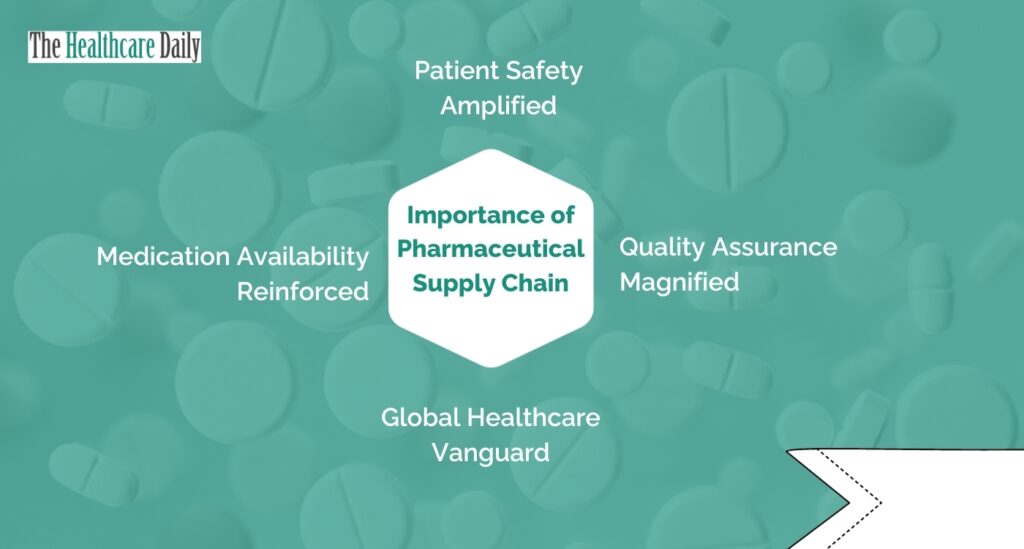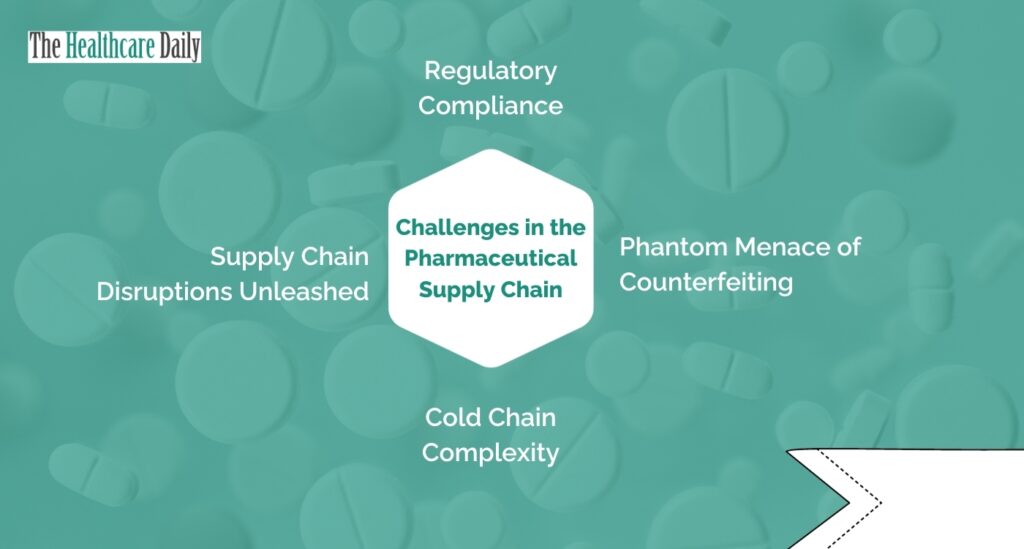Strengthening Pharmaceutical Supply Chain Resilience

The Pharmaceutical supply chain is the lifeblood of the healthcare industry, acting as the intricate network responsible for ensuring the timely and efficient delivery of life-saving medicines and healthcare products to patients across the globe. It is an exceedingly complex and interwoven system that orchestrates the complete lifecycle of pharmaceuticals, spanning their inception and development through production, distribution, and eventually, their delivery to healthcare providers and patients.
The paramount importance of a robust pharmaceutical supply chain cannot be overstated, for it wields a profound impact on patient safety, healthcare outcomes, and, by extension, the broader healthcare ecosystem.
In this comprehensive article, we will discuss the core fundamentals that underpin the pharmaceutical supply chain, dissect its monumental significance, delve into the intricacies of its challenges, explore innovative and far-reaching solutions, and cast a forward-looking gaze into the promising and resilient future it holds.
Table of Contents
- What is the Pharmaceutical Supply Chain?
- Importance of Pharmaceutical Supply Chain
- Fundamentals of Pharmaceutical Supply Chain
- Challenges in the Pharmaceutical Supply Chain
- Solutions to Strengthen Pharmaceutical Supply Chain Resilience
- Future Aspects of the Pharmaceutical Supply Chain
- Conclusion
What is the Pharmaceutical Supply Chain?
The pharmaceutical supply chain emerges as an intricate web of meticulously connected steps and processes, each bearing the weight of responsibility for facilitating the manufacturing, distribution, and delivery of pharmaceutical products to the eager hands of healthcare providers, ultimately culminating in the benefit of patients in need.
This colossal logistical endeavour encompasses the entire lifecycle of pharmaceutical compounds and products, from their painstaking development and meticulous production to the meticulous distribution and ultimately the timely dispensing to patients whose lives often depend on them.
Importance of Pharmaceutical Supply Chain
 Source: The Healthcare Daily
Source: The Healthcare Daily
The pharmaceutical supply chain takes centre stage as a linchpin in the grand tapestry of the healthcare realm, rendering its importance inescapably evident through the following profound facets:
Patient Safety Amplified: At its core, the pharmaceutical supply chain stands as a sentinel of patient safety, zealously guarding the sanctity of life by ensuring that patients, irrespective of their location or circumstances, unfailingly receive the correct medications at the precise moments they are required.
Medication Availability Reinforced: It stands as a relentless bastion of medication availability, upholding an uninterrupted supply of vital medicines that hold the power to ameliorate a myriad of medical conditions, be they chronic ailments or life-endangering emergencies.
Quality Assurance Magnified: As a staunch advocate of quality assurance, the pharmaceutical supply chain leaves no stone unturned in preserving the quality of pharmaceutical products throughout their odyssey from manufacturing plants to the waiting hands of patients. This meticulous stewardship acts as an impenetrable barrier against contamination, counterfeiting, or any compromise in therapeutic efficacy.
Global Healthcare Vanguard: During the tumultuous tides of pandemics or public health emergencies, the pharmaceutical supply chain unfurls its banner as an unwavering champion, masterfully orchestrating the swift and efficient distribution of vaccines, medications, and life-saving supplies to the farthest reaches of the globe, thus playing a pivotal role in humanity’s collective health response.
Fundamentals of Pharmaceutical Supply Chain
Unravelling the intricate tapestry of the pharmaceutical supply chain necessitates a nuanced understanding of its quintessential fundamentals, each of which plays an indispensable role in orchestrating this symphony of healthcare logistics. The pivotal components include:
Manufacturers Embodied: Pharmaceutical companies serve as the visionary architects and master craftsmen of the pharmaceutical supply chain, embarking on the arduous journey of researching, developing, and meticulously producing the lifelines of healthcare, i.e., medications. They bear the weighty responsibility of adhering to uncompromising quality control standards and navigating the labyrinthine maze of regulatory requirements that define the industry.
Raw Materials and APIs: The pharmaceutical supply chain finds its roots in the sourcing of raw materials and Active Pharmaceutical Ingredients (APIs), procured from global sources. These are the elemental building blocks that breathe life into pharmaceuticals, and their consistent supply is paramount to the industry’s health and vitality.
Distribution Centers: Distributed across the expanse of nations, distribution centres serve as the vigilant nuclei of logistics, embracing the role of receiving, safeguarding, and orchestrating the precise dispatch of pharmaceutical products to diverse destinations. These centres are entrusted with maintaining optimal temperature and storage conditions, ensuring the integrity of the life-saving cargo they harbour.
Transportation Network: The pharmaceutical supply chain unfolds as a transcontinental odyssey, traversing the gamut of transportation modes, including air, sea, and land. The transport of temperature-sensitive medications demands specialized cold-chain logistics, exemplifying the dexterity required to preserve pharmaceutical integrity.
Pharmacy and Healthcare Providers: In the grand narrative of healthcare, pharmacies and healthcare institutions constitute the venerable torchbearers of the pharmaceutical supply chain. Their pivotal role involves the distribution of medications to patients and the provision of critical healthcare services, thus forming the indispensable bridge that connects the industry’s endeavours to tangible patient outcomes.
Challenges in the Pharmaceutical Supply Chain
 Source: The Healthcare Daily
Source: The Healthcare Daily
Regulatory Compliance: The pharmaceutical landscape is painted with a tapestry of stringent regulations and compliance requirements that differ markedly across regions and nations. Navigating this labyrinthine web of regulations can often lead to delays, escalated costs, and regulatory hurdles that impede the rapid flow of essential medications.
Phantom Menace of Counterfeiting: A lurking menace in the pharmaceutical supply chain is the pervasive spectre of counterfeit drugs. This perilous threat poses a substantial risk to patient safety, product quality, and the industry’s overall integrity.
Cold Chain Complexity: The preservation of temperature-sensitive medications throughout their journey within the supply chain is a complex and costly endeavour. A failure in maintaining the integrity of these pharmaceuticals can result in compromised efficacy and patient safety.
Supply Chain Disruptions Unleashed: Natural disasters, geopolitical tensions, and global health crises loom as potential disruptors, casting their long shadows over the pharmaceutical supply chain. These unforeseen disruptions have the potential to trigger critical shortages and ripple effects that reverberate across the healthcare landscape.
Solutions to Strengthen Pharmaceutical Supply Chain Resilience
Digitalization Empowered: Harnessing the transformative power of technology, the pharmaceutical supply chain is embracing the dawn of digitalization, with blockchain and the Internet of Things (IoT) leading the charge. These digital sentinels enhance traceability and transparency across the supply chain, ensuring that every transaction is etched indelibly into the annals of digital history.
Analytics Illuminated: Predictive analytics emerges as a formidable ally, empowering the industry with the ability to forecast demand with uncanny precision and proactively identify potential disruptions. Armed with data-driven insights, the supply chain can anticipate and avert challenges before they escalate into crises.
Collaboration: The power of collaboration among stakeholders, be they governments, manufacturers, or logistics providers, is gaining ever-increasing recognition. By fostering an environment of open communication and cooperation, the pharmaceutical supply chain can effectively share critical information and mount a united front in times of crisis.
Sourcing Diversified: Overreliance on a single source of raw materials or APIs is a precarious position to occupy. To mitigate supply chain risks, the industry is increasingly diversifying its sourcing strategies, reducing vulnerability to the capricious whims of geopolitics and supply chain disruption.
Future Aspects of the Pharmaceutical Supply Chain
Advanced Technologies Ascent: The inexorable ascent of advanced technologies, such as artificial intelligence (AI) and robotics, is set to usher in an era of unprecedented automation and optimization within the pharmaceutical supply chain. These technological sentinels will assume a multifaceted role, from bolstering efficiency to enhancing security.
Personalized Medicine Pioneered: The advent of personalized medicine, buoyed by advances in genetics and cutting-edge therapeutics, demands a supply chain that is agile and adaptable. The pharmaceutical supply chain will need to evolve to accommodate the unique needs of individual patients, delivering tailored treatments with precision and swiftness.
Global Collaboration Forged: The drumbeat of global collaboration will grow louder as nations and organizations recognize the need to pool resources and knowledge to address pressing global health challenges. This collaborative spirit will extend beyond geographical borders, ensuring equitable access to medicines for all.
Environmental Sustainability Championed: The clarion call for environmental sustainability will echo throughout the pharmaceutical supply chain. An industry built on saving lives will increasingly focus on minimizing its carbon footprint and adopting sustainable practices across all facets of its operations.
Telemedicine Transformation: The burgeoning growth of telemedicine will reverberate through the supply chain. Changes in distribution and delivery dynamics, driven by the rise of remote healthcare services, will reshape the industry’s landscape.
Conclusion
The pharmaceutical supply chain, as the guardian of healthcare’s lifeblood, holds a position of importance in the global healthcare ecosystem. With its multifaceted fundamentals, intricate challenges, innovative solutions, and promising future aspects, it stands as the unwavering sentinel ensuring that patients have unfettered access to life-saving medications.
Through the proactive address of challenges and the embrace of cutting-edge innovations, the pharmaceutical supply chain ensures that it remains an indomitable cornerstone of healthcare, unswervingly committed to the cause of human well-being on a global scale.








